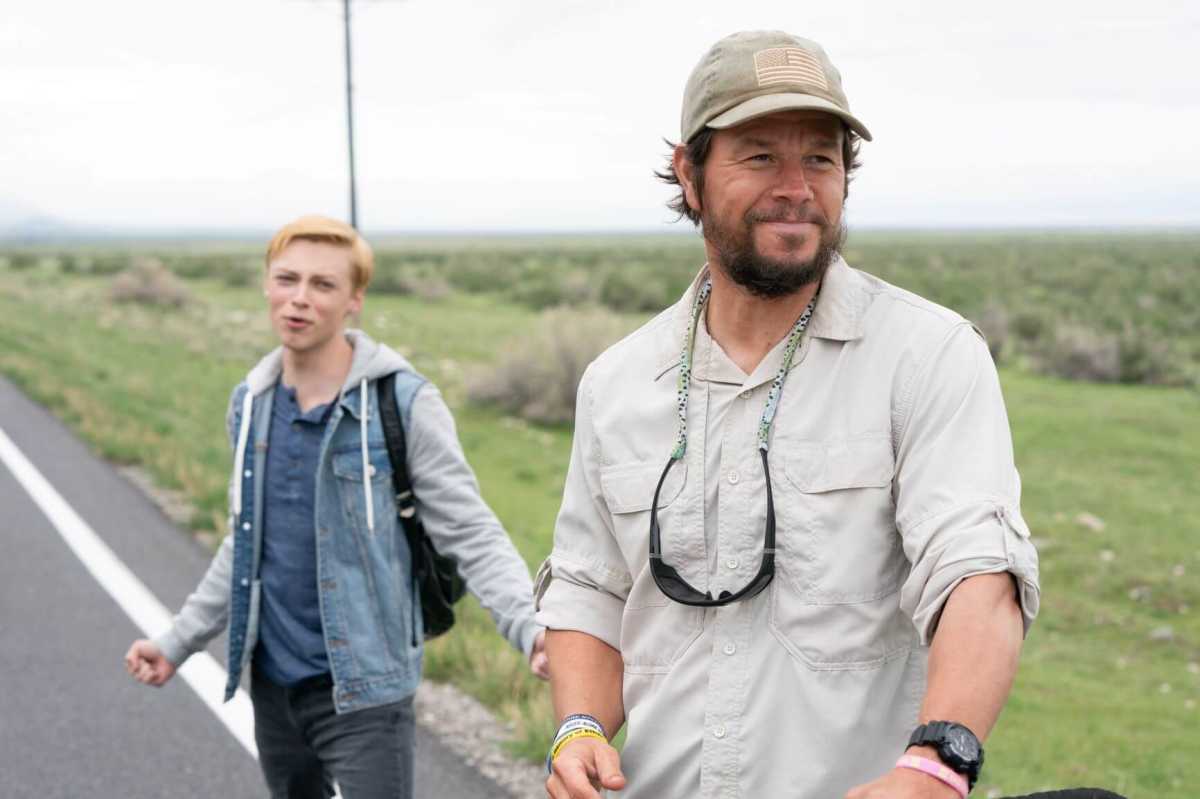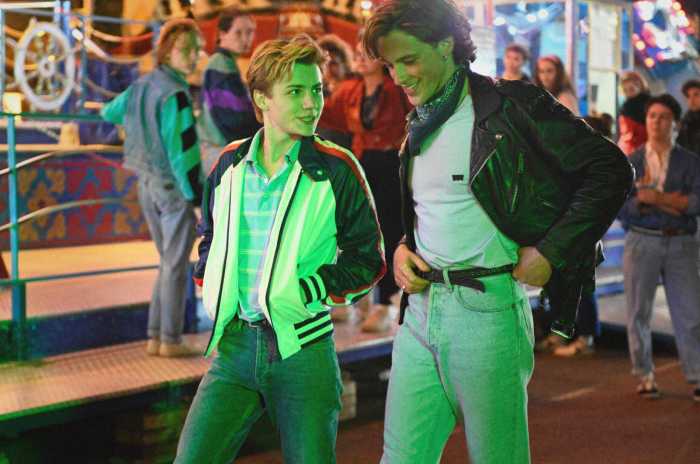Reinaldo Marcus Green’s “Joe Bell” is blithely unaware of the ways in which it reinforces the devaluation of gay lives it was supposedly made to fight against. Based on the true story of its title character (Mark Wahlberg), a middle-aged father who went on a walking trip to fight bullying after his gay son Jadin (Reid Miller) killed himself, it reduces Jadin to a fantasy figure redeeming his dad from toxic masculinity. It transforms a real-life suicide, which took place in 2013, into a gotcha plot gimmick. Green’s direction hints strongly at Christian imagery: as Joe and Jadin walk down a highway, they’re surrounded by telephone poles framed in the shape of crosses. But the film would rather turn their experiences into a passion play than imagine gay life as an anything other than a vale of tears leading to early death.
“Joe Bell” shows Joe and Jadin setting out by foot on a cross-country trip to raise awareness about bullying. Joe stops along the way to speak to groups of supportive adults. The two talk about Jadin’s experience of extreme homophobia, and the film inserts flashbacks illustrating them. But when Joe stops at a gay bar around the 40-minute mark and chats with a drag queen, he refers to Jadin’s suicide for the first time in the film (although many hints that Jadin is no longer alive were dropped before that point.) We realize that he has resurrected his son in his mind for conversations he wishes had occurred in real life. From that point, Joe’s quest continues, but the image of Jadin drops out of the film except for further flashbacks.
Like the casting of Mel Gibson as a corrupt, racist cop in S. Craig Zahler’s “Dragged Across Concrete,” the choice to have Mark Wahlberg play Bell reflects the actor’s real experience. While he first became famous in 1991 for sub-Vanilla Ice rapping as the leader of Marky Mark & the Funky Bunch, he spent his teenage years committing hate crimes against Black and Asian people.
When he was 16, he beat a Vietnamese immigrant, Johnny Trinh, so badly that he believed he had blinded him in one eye, although Trinh has forgiven Wahlberg and says that his eye damage was sustained years before during the Vietnam War.
Obviously, people can learn from their experience and change in a positive direction. But his public attempts at atonement look self-serving. In 2014, he asked for a pardon for his convictions, finding it necessary to run his burger restaurant Wahlburger’s. Without knowing Wahlberg as a person, it’s impossible to know how sincere his change of heart is, but “Joe Bell” seems intended as a reflection on his own moral failings. When Joe says “bullying and intolerance can have a deadly effect” in an early scene, this recognition is supposed to speak both for the character and actor, making the latter look better.
Frustratingly, “Joe Bell” could have been far more substantial if it leaned into the biting ironies of this casting. But it goes for an easy melancholy, all muted lighting and downbeat Americana. (The guiding spirit of an aging man’s guilt and road-trip narrative play like a dumbed-down version of David Lynch’s “The Straight Story.”) Its depiction of Jadin is Gay Stereotype 101: he loved Lady Gaga (he and Joe deliver a rousing rendition of “Born This Way” while on the road), expressed gender non-conformity by becoming a cheerleader (while lusting after the football players he couldn’t be), and suffered an endless amount of victimization, including getting crowded and threatened with rape by grimacing jocks in his school’s shower. It’s hard to criticize this movie without suggesting a dig at real LGBTQ people who have lived out a similar life, but only Miller’s performance brings any nuance to the character. He seems as ghostly and evanescent as his appearances in the first 40 minutes turn out to be. He’s not the only character whose place in the story exists only to help Joe: the kindly sheriff who also has a gay son (Gary Sinise) that Joe meets towards the film’s end also plays like a plot device rather than a believable person.
“Joe Bell” brings back memories of “Boy Erased,” another film supposedly made to combat homophobia while being unable to imagine anything positive about being gay. This wasn’t made for actual gay youth at all. It was meant to speak to right-leaning guys like Bell (or Sinise and Wahlberg, in real life), who might be parents of queer teens. Joe fits a familiar version of American masculinity: content with small-town life, tolerant of violence as long as it’s aimed at the “right” targets, hesitant to express strong emotion. Wahlberg glammed down for the role, sporting uncombed hair and a scruffy beard.
To their credit, the script and Wahlberg’s performance do demonstrate how Joe jumped into activism and public statements of support for gay youth without fully examining his own prejudice. But a better version of a similar storyline already exists: gay director Russell Mulcahy’s made-for-Lifetime movie “Prayers for Bobby.” “Joe Bell” hints at the its title character’s blind spot, blithely unaware that it turns a real person’s suicide into the origin story for someone else’s redemption arc.
JOE BELL | Directed by Reinaldo Marcus Green Roadside Attractions Opens July 23rd





































